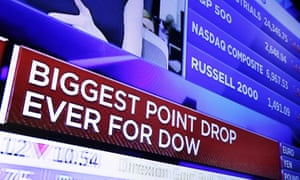/cdn.vox-cdn.com/uploads/chorus_asset/file/10162647/GettyImages_912362356.172945.jpg) |
Stocks Plunge as Sell-Off Enters 2nd Week
The Dow Jones industrial average plunged a heart-stopping 1,600 points in afternoon trading before gaining back some ground — finishing at 24,342, down 4.6 percent. Asia stocks fell early Tuesday, following a volatile day in U.S. trading.
- Markets slumped as investors assessed whether the global economy was moving away from the slow growth, low inflation and low interest rates that prevailed over the last decade.
- The weakness built off the previous week, when stocks had their worst performance in two years.
 |
- The Dow wasn’t the only one to suffer losses; the S&P 500 fell 4.1 percent and the Nasdaq Composite slumped 3.8 percent. Financial, health care, and industrial sectors all took significant hits. [The Guardian]
- More reasons behind the Dow’s sudden plunge: First of all, there’s new leadership at the Federal Reserve, bringing concerns that the Fed could raise interest rates to combat inflation. The Fed will likely do this slowly, but there are still fears this would raise the cost of mortgages and loans, as well as company loans. [CNN / David Goldman]
- But a slowdown may not be all bad; stocks have been soaring for months now, and a sharp drop could simply be a correction. [CNBC / Thomas Franck]
- [Thus] the headlines may seem scarier than the actual event because we haven’t seen a drop like this for a long time (but we also haven’t seen so much stock market growth for a long time). [NYT / Neil Irwin]
Stocks are a higher-risk investment than bonds, which are backed by the United States Treasury. If bond yields start to rise, investors will want to take some of their money out of stocks and put it into safer bonds.
Sure enough, bond yields hit a four-year high Friday. (They pulled back a bit on Monday.) The recent tax bill has forced the Treasury to borrow more money, which will put more bonds into play. A supply glut could devalue bonds. Prices and yields move in opposite directions, and bond buyers will want a higher yield (and lower price) to make it worth their investment.
Inflation is bad for bonds, too. If borrowing costs increase, bond investors will want more return -- a higher yield.
Attractive yields on a safer investment have made stocks suddenly less attractive.